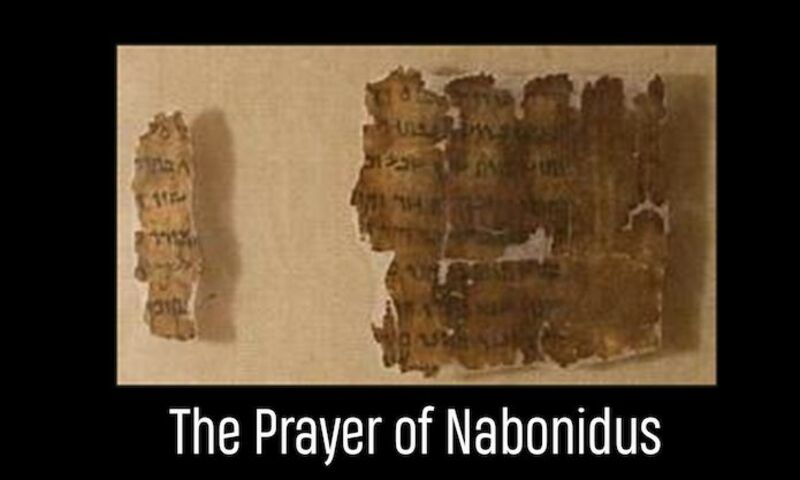The Prayer of Nabonidus

“The Prayer of Nabonidus is a legendary account preserved in Aramaic that describes the punishment and healing of the Babylonian king Nabonidus. In the Prayer of Nabonidus, the recovery from the imposed illness is attributed to the recognition of the God of the Jews as the highest and only God. The text has only been preserved in fragments of a single manuscript, which was found together with numerous other scrolls by Bedouins in 1952 in Cave 4 near Qumran on the Dead Sea. It is now in the possession of the Israel Museum.”—Wikipedia
Nabonidus was the father of king Belshazzar of Babylon, with whom he ruled as co-regent for at least several years. A Qumran, Dead Sea scroll from about 50 BCE, commonly called The Prayer of Nabonidus (PN), or 4QprNab, written in Aramaic, is an Apocryphal account of a healing of Nabonidus that may be based loosely on Daniel 4. This text tells us that king Nabonidus was inflicted with a physical ailment for seven years, until a Jewish exorcist pardoned his sins, who then encouraged Nabonidus to document the event and to give praise to God, who pardoned him. In the final section of the scroll Nabonidus declared that his prior supplications to the gods of the world concerning his ailment had gone unanswered.
The scroll suggests that Nabonidus journeyed to Tema, Arabia, and remained there for a number of years. This detail is accurate, since Nabonidus was away from his throne in Babylon for ten years. Apart from that, however, there is little reason to regard The Prayer of Nabonidus as historical. It appears that the story is possibly based on the Biblical account of Nebuchadnezzar.
Some, even among scholars, consider The Prayer of Nabonidus to be a parallel to, or even an earlier version of, the Biblical account of Nebuchadnezzar in Daniel chapter 4. However, there are some very important differences. First, the kings were different: Nebuchadnezzar and Belshazzar in Daniel and Nabonidus in PN. Second, the maladies are different: Nebuchadnezzar’s apparent insanity and Nabonidus’ skin ailment. Third, God, through the prophet Daniel, warned Nebuchadnezzar before God judged him, whereas the Jewish diviner told Nabonidus to give God glory after God had healed him. Fourth, Nabonidus confessed his worship of false gods for seven years, while Nebuchadnezzar’s pride led to his humiliation before God restored him.
The PN is the stuff of legend. The true God, Yahweh, doesn’t operate through exorcists. The Hebrew scripture canon of God “inspired” books (2 Timothy 3:16) closed after the books Ezra, Nehemiah, Esther and Malachi were written sometime before 400 BCE, long before the apocryphal PN was written.
Unlike the very important God inspired book of Daniel, the uninspired Prayer of Nabonidus is almost all fiction, making it essentially worthless. Since about 50% of the Dead Sea Scrolls documents are non-Biblical, simply being found among the Dead Sea scrolls doesn’t mean it is Biblical.
According to the Bible, we’re to “pay no attention to Jewish myths” (Titus 1:14 NIV), such as the Prayer of Nabonidus..